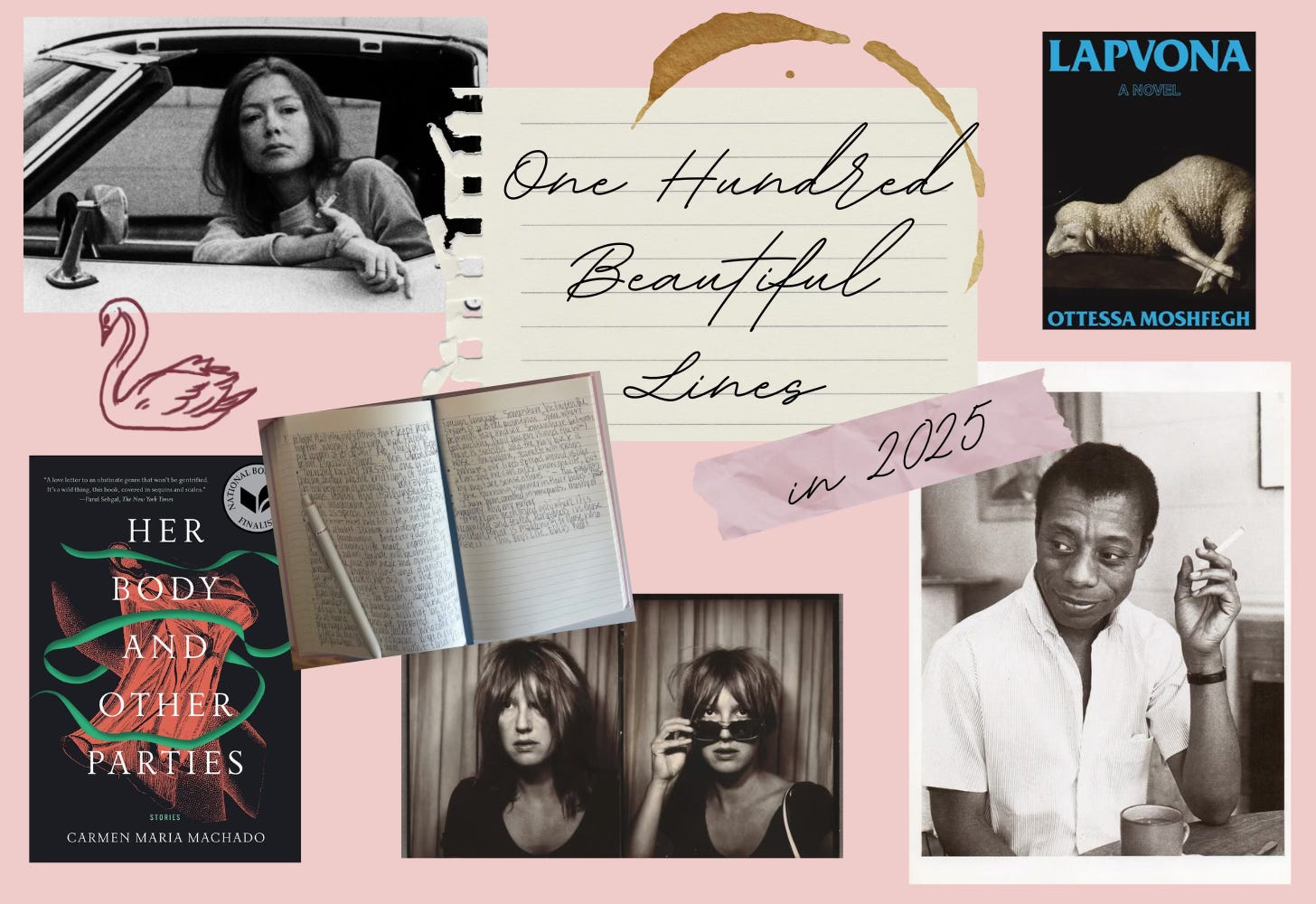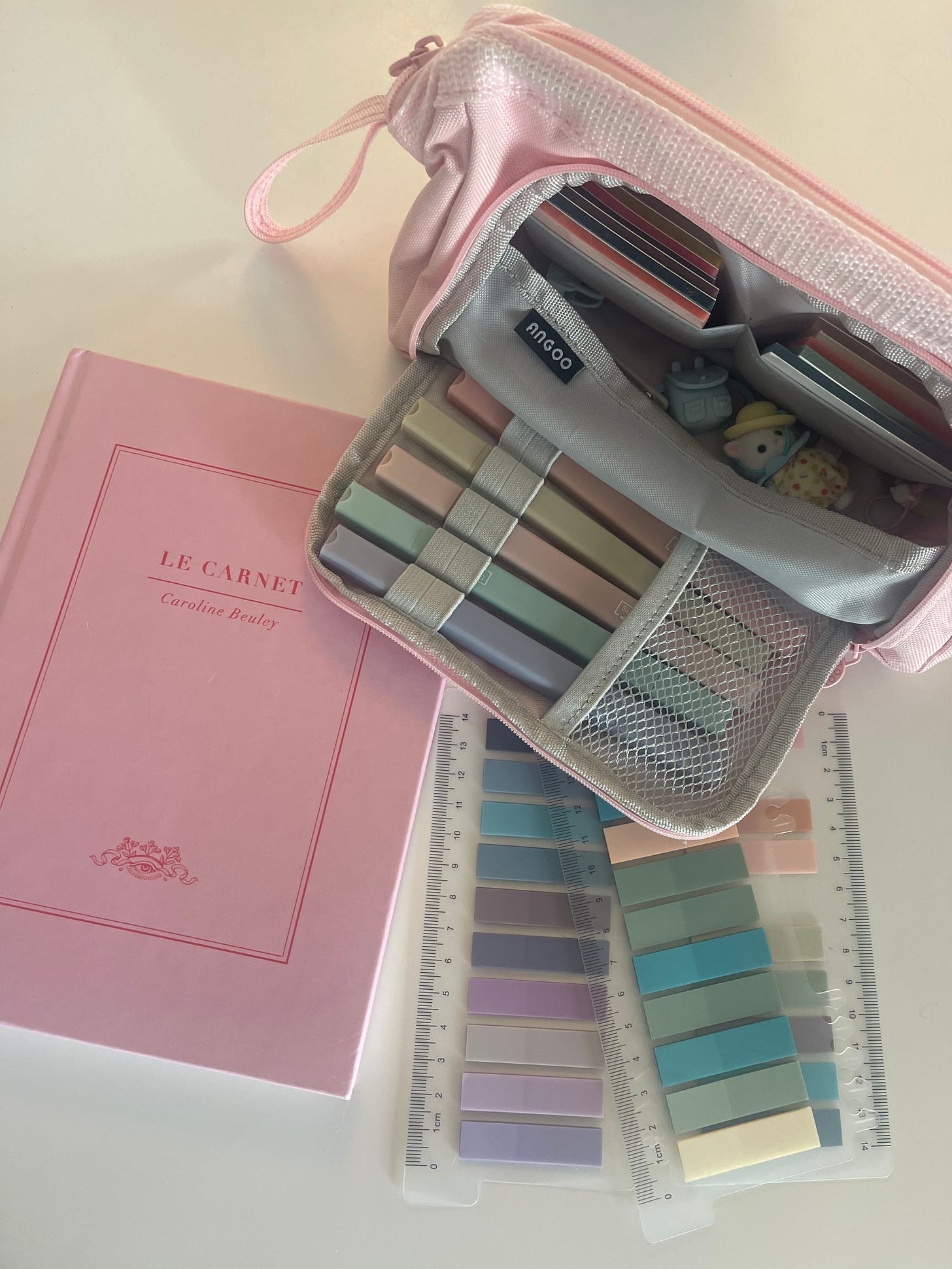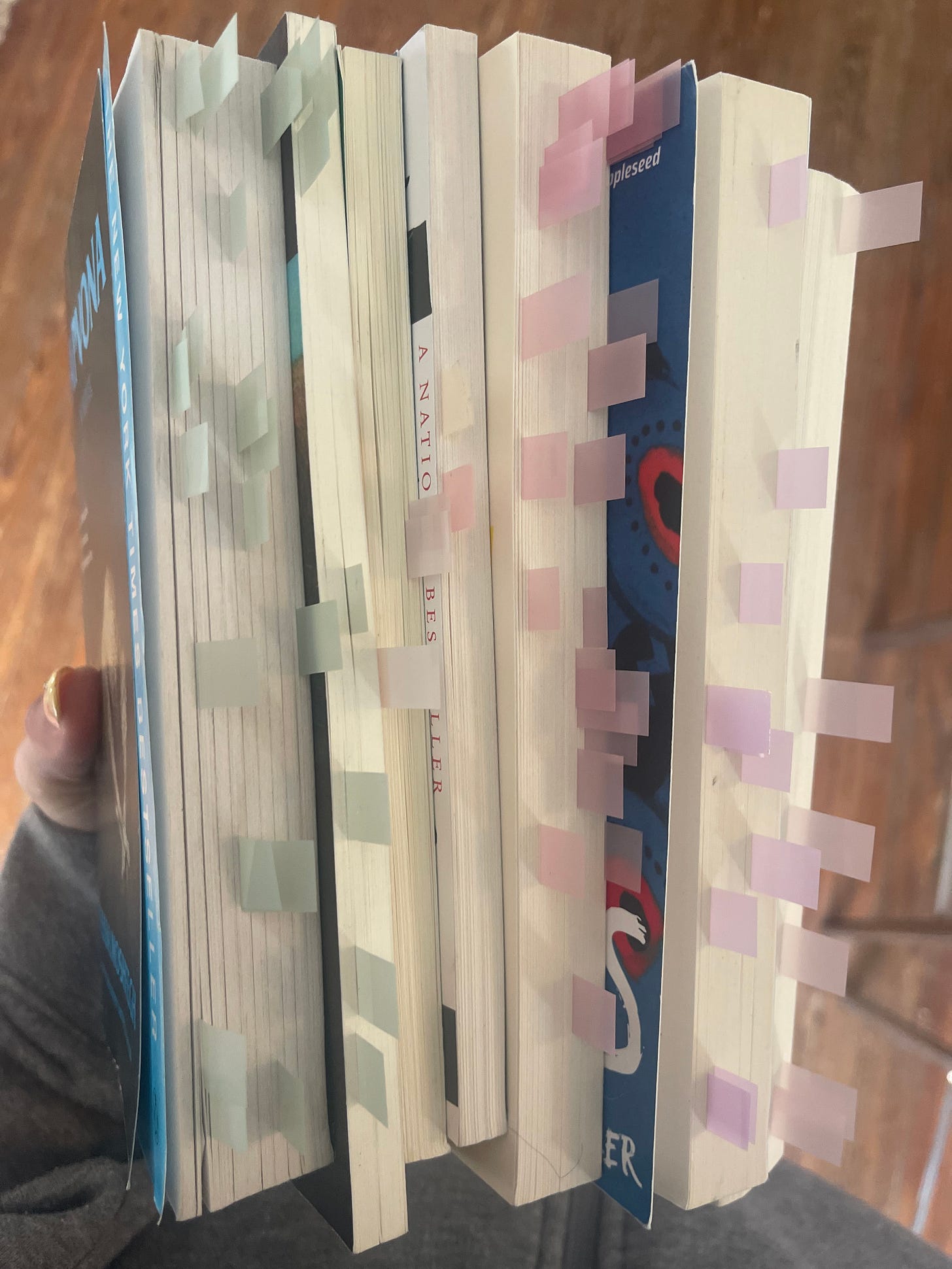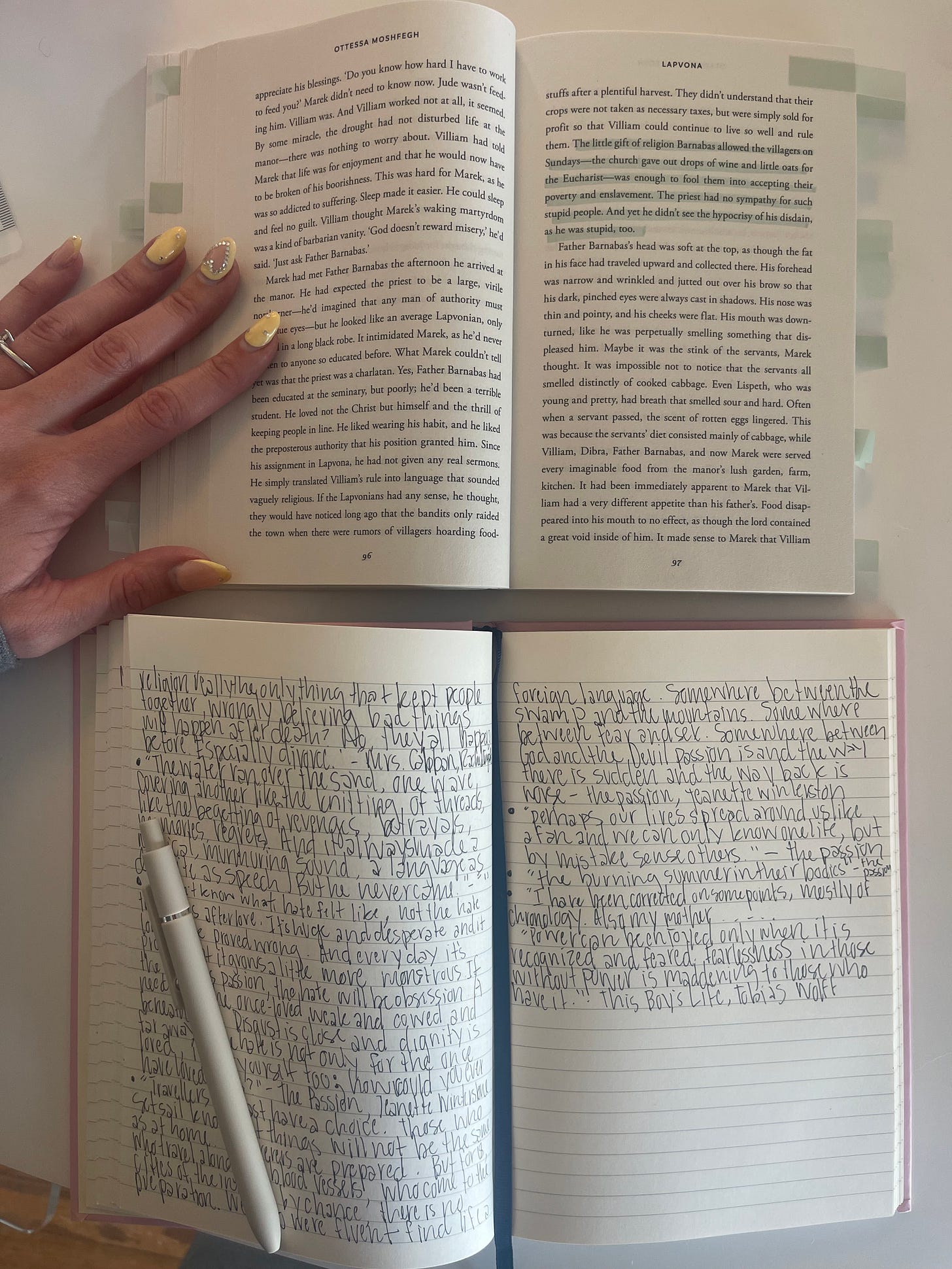100 Beautiful Lines from Literature, Part 1
25 lines from 25 works, 25% of the way through 2025
I have been collecting these lines (or, in some cases, passages) in my commonplace book since January 1st. The goal is to collect 100 beautiful lines in 2025, so stay tuned for part 2 at the end of June, part 3 at the end of September, and part 4 at the end of December. For my methodology and a few details on how and why I keep a commonplace book, read to the end of the article.
“Keepers of private notebooks are a different breed altogether, lonely and resistant rearrangers of things, anxious malcontents, children afflicted apparently at birth with some presentiment of loss.” — “On Keeping a Notebook,” Joan Didion
“Power can be enjoyed only when it is recognized and feared. Fearlessness in those without power is maddening to those who have it.” — This Boy’s Life, Tobias Wolff
“Now, if I complain of superabundance I must remember: too much is so far happier than too little that they do not belong on the same seesaw.” — Life Work, Donald Hall
“The water ran over the sand, one wave covering another like the knitting of threads, like the begetting of revenges, betrayals, memories, regrets. It made a musical, murmuring sound, a language as definite as speech. But he never came.” — Mrs. Caliban, Rachel Ingalls
“I didn’t know what hate felt like, not the hate that comes after love. It’s huge and desperate and it longs to be proved wrong. And every day it’s proved right, it grows a little more monstrous. If the love was passion, the hate will be obsession. A need to see the once-loved weak and cowed and beneath pity. Digust is close and dignity is far away. The hate is not only for the once-loved, it’s for yourself too; how could you ever have loved this?” — The Passion, Jeanette Winterson
“Now a boy is of all the wild beasts the most difficult to manage.” — Laws, Plato
“Vulgar, ill bred, drooling, uninvited Art. It’s the only thing that’s real other than murder, I sometimes think—or death. Art’s the fun part, at least for me. It’s the salvation.” —Didion & Babitz, Lili Anolik
“What happened to the writer is not what matters; what matters is the large sense that the writer is able to make of what happened.” — The Situation and the Story, Vivian Gornick
“But then it is a Sunday afternoon. My husband and I are playing Monopoly Junior with our daughter. Chet Baker’s trumpet fills the room. I hated jazz when I was single, but now our marriage is steeped in this music, in the ways I’ve changed and the things I’ve come to know, in exasperation and elegance, in the poetry of dailiness, in the solace of each other’s company. I see the ways my husband saved me, the ways I save him. There is still pain in the phantom limbs lost in the making of this marriage, but in that moment the loss seems a manageable part of the trade. I see only the courage and the kindness that marriage elicits, not the cost, and it seems to me that it gives us our only chance to be heroes. I want the song Baker is playing never to end.” — “For Better and Worse,” Lynn Darling.
“If only this was a world where people said vagina all the time like they said car or weather or Tuesday or dear: what kind of world would that be?” — Half-Lives, Lynn Schmeidler
“Nonetheless, character—the willingness to accept responsibility for one’s own life—is the source from which self-respect springs. Self-respect is something that our grandparents, whether or not they had it, knew all about. They had instilled in them, young, a certain discipline, the sense that one lives by doing things one does not particularly want to do, by putting fears and doubts to one side, by weighing immediate comforts against the possibility of larger, even intangible, comforts.” — “On Self-Respect,” Joan Didion
“As a grown woman, I would have said to my father that there are true things in this world only observed by a single set of eyes.” — “The Husband Stitch,”
“A word I remember coming out of my parents’ mouth a lot was imagine—as in, ‘I imagine we’re going to have rain.’ I soon succumbed to the notion that to imagine was to claim to know in advance an entirely forgettable outcome. A calendar was hung in the kitchen as if to say expect more of the same.” — The Sentence is a Lonely Place, Garielle Lutz
“We must work the works of Him who sent me, while it is day: night comes, when no one can work.” — The Bible, John 9:4
“We wanted more. We knocked the butt ends of our forks against the table, tapped our spoons against our empty bowls; we were hungry. We wanted more volume, more riots. We turned up the knob on the TV until our ears ached with the shouts of angry men. We wanted more music on the radio; we wanted beats; we wanted rock. We wanted muscles on our skinny arms. We had bird bones, hollow and light, and we wanted more density, more weight. We were six snatching hands, six stomping feet; we were brothers, boys, three little kings locked in a feud for more.” — We the Animals, Justine Torres
“At every turn, after all, we’re confronted with vivid examples in which individual and collective interests clearly diverge. When all stand to see better at a crowded event, for example, no one sees any better than if all had remained comfortably seated. Yet no one regrets standing, since the alternative is not to see at all.” — “On the Behavioral Economy of the Book World,” Robert Frank
“My father drank. He drank as a gut-punched boxer gasps for breath, as a starving dog gobbles food—compulsively, secretly, in pain and trembling. I use the past tense not because he ever quit drinking, but because he quit living.” — “Under the Influence,” Scott Russell Sanders
“It seems to be typical of life in America, where opportunities, real and fancied, are thicker than anywhere else on the globe, that the second generation as no time to talk to the first.” — Notes of a Native Son, James Baldwin
“That was the year, my twenty-eighth, when I was discovering that not all of the promises would be kept, that some things are in fact irrevocable and that it had counted after all, every evasion and ever procrastination, every word, all of it.” — “Goodbye to All That,” Joan Didion
“She didn’t think about people or her past, only the movement of air and the shadow of sound it carried.” — Lapvona,
“I’m staring at the keyboard. The keys are long and white as fangs, and I imagine that for every glowing piano keyboard in the world there’s some beast left toothless and vulnerable.” — Motherthing, Ainslie Hogarth
“In fact someone…intelligent…is a prime target. Intelligent and ambitious people want to be challenge, and someone having high expectations of you is a turn-on. High demand is a motivator, success is a drug, and before you know it, you’re rationalizing anything in order to meet the demand and get your high.” — Dinner for Vampires, Bethany Joy Lenz
“The best lack all conviction, while the worst / Are full of passionate intensity.” — “The Second Coming,” W.B. Yeats
“I dreamed that night of the women I knew and the girls they’d once been and the girls I knew and the women they’d become, a slow gradual morphing of one into the other. In the end, there was only me, standing in the sunlight, a girl in dusty sandals and denim shorts, chipped nail polish and cigarette breath. She was alone and a little bit sad, hopeful, the way young girls are. I could see her future spooling out before her, brilliant and terrible and vast.” — My Last Innocent Year,
To conclude, I’ll share my favorite line I’ve published in the last 3 months (mostly bc I only read 24 things, and I needed a 25th): “Her hair was alive, writhing with salamanders. They thrashed amongst the strands, a slick brown amongst the tangled black. They climbed over each other, flat paws and flat eyes and tentacular bodies seething into a wreath around her face. They didn’t scuttle when I approached. They continued burrowing, claiming her hair with their slithering, snake-like bodies. They were attracted to something in her, felt entitled to it.” — “Medusa,” Caroline Beuley
I would love if you commented some of your favorite lines/passages you’ve read so far in 2025! And stay tuned at the end of June for part 2!
Keeping a Commonplace Book
The Masterclass on commonplace books defines them as follows:
“A commonplace book is a system for writing down and sorting all manner of tidbits: quotes, anecdotes, observations, and information gleaned from books, conversations, movies, song lyrics, social posts, podcasts, life experiences, or anything else that you might want to return to later. It’s called a commonplace book because you collect all of this in one common place—a central resource that makes it easy to find, re-read, and utilize each piece of wisdom you have obtained.”
Writers ranging from Joan Didion to H.P. Lovecraft to Marcus Aurelius to Virginia Woolf have kept commonplace books. If you want highly detailed accounts of how this is done, there are many existing articles on Substack about the practice.
But, for me, I prefer to keep it simple. I simply don’t have the energy to write down everything interesting I’m seeing or hearing in a day. So, my commonplace book only consists of quotes from physical books I’ve read. I refer back to it as a source of inspiration and instruction for my own writing. Keeping it was a new year’s resolution of mine for this year, and I’ve absolutely loved doing it. Here’s how I got started:
I bought a nice notebook and nice set of highlighters, pens, and sticky notes, that way everything I need is in one place.
When I’m reading, I highlight stand-out lines/passages and mark the page with a sticky note from the aforementioned set. I do NOT stop and enter each quote into my commonplace book as I read as that would completely interrupt the flow of reading for me.
When I finish a book, I flip back to each sticky-noted page. If the quote still strikes me, I copy it over into my commonplace book. Usually I only end up transferring about half of the quotes I highlighted. Every quote listed in the 25 quotes above is from my commonplace book.
And that’s it! I think many people don’t start a commonplace book because it can sound like quite an overwhelming prospect! But in order to make it manageable for myself, I just narrowed the scope. That’s the great thing about commonplace books—they’re really just a way to collect inspiration, so do whatever works best for you!










Finally, read it. This is so beautiful. You motivated me to keep a commonplace notebook❤️
Some quotes that I like from books I’ve read in the past few months.
“Because that's the thing about the future. You can't get there by imagining. You can only get there one step at a time, and the hardest part is taking that first step.” -The Ride of her Life
“Sometimes life is just like that, Annie thought. You can be so worried about the challenge in front of you that you fail to realize that you've been chipping away at it all along.” -The Ride of her Life
“It's clear to me now why God answered me with silence that night. Silence is the hallmark of the vulnerable. They are vulnerable for many reasons, but this may be the main one: When they call, no one answers. And it's not because they can't talk, not because they don't have something important to say.” -The Common Rule: Habits of Purpose for an Age of Distraction